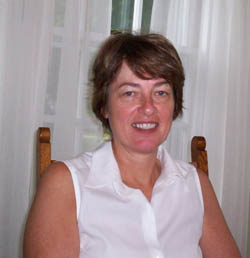Monica Houghton

Depending on the kindness of strangers
Getting opera scenes played and heard
by Kelly Ferjutz
(February 2008)
Which takes longer? Writing the opera or getting to hear it? That question is prominent in the mind of Cleveland composer Monica Houghton, who decided to write an opera in 1997. Granted, not everyone comes up with that idea, but it seemed like a good idea at the time. It was a logical sort of progression. Monica had gone to New York to see an opera or two, and was so taken with Tchaikovsky's most Russian opera Mazeppa that she suddenly had this mad passionate idea. "It really struck me," she says now with a smile. "It was so Russian, and had such a sense of place. I wanted nothing more in the world than to write an opera with that 'sense of place' about my country- the American West."
Monica had been teaching piano students in Kent since 1990, and in 1993, she began to study composition with Akron composer Mary Ann Griebling. Soon thereafter, Monica joined the Cleveland Composers Guild, was accepted into the graduate program in composition at the Cleveland Institute of Music in 2000, and moved to Shaker Heights. Even while working her way toward a master's degree in orchestral composition, she continued working on her opera. Now, she's on the faculty at CIM and still composing. A lot.
And now, the opera is now complete, but not without a fair amount of angst and twiddling and tweaking along the way. Although born in Vermont, Monica grew up in Reno, so her love of the American West came naturally. Of course, she still had friends there, and one of them, Jon Christensen (a writer and sometime actor) steered her toward the legendary William Wright. Never heard of him? Well, maybe you've heard of Dan DeQuille? Still nothing? Then, how about Mark Twain? Yes, that Mark Twain.
It seems that when Iowan William Wright went West to become a writer in the 1850's, he left behind a wife and family. He became a reporter for the Territorial Enterprise in Virginia City, Nevada, as did Mark Twain (Samuel Clemens in disguise) at the same time. This seemed the perfect setting for an opera. Thus The Big Bonanza, set in the Wild West when silver mines (Comstock Lode) were the source of all wealth and power. Passion and murder appear as well. Twain even wrote about the murder, which really did happen.
As it happens, Monica's degrees from Harvard--a Bachelors in Chinese and Master's in East Asian Studies--came in handy when she went off to China to do musical research in 2004. She'd always been interested in languages and various cultures. "Art, philosophy, poetry. It's useful to know these things," she says. In her opera, Zhang is a Chinese laborer who sings about being homesick for his native country so she went looking for an authentic Chinese ‘homesickness' song, "because authenticity is important when writing an historical piece."
But, as difficult as it is to write an opera, it's even more of a challenge to be able to hear it performed. Monica's been lucky so far as several of the scenes have had readings of some sort or another. A full orchestra is of course the most highly desired, but the most difficult to arrange. Piano accompaniment is somewhat easier to come by. But hearing just one scene at a time, spaced out over months or years, and also out of order, creates a level of frustration and difficulty. Still, she perseveres.
In its current incarnation, Big Bonanza has ten scenes, and so far, since 2001, eight of these have been heard in some form or another. It's tantalizing, to say the least, but the composer desperately needs to know if chasing the rainbow is really worth it. Of course, she believes in her project, but she's not an opera producer. Or at least she hasn't been up to now.
Several people have been kind enough to read through the piano score, and listen to the CD of the produced scenes and offered feedback. Some of these comments sent the composer back to the keyboard again, resulting in the addition of another aria for Dan's wife, Caroline, still back in Iowa, and a few minor tightening-up efforts here and there: the hanging scene, the fire in the mine scene, and the miner's trio. This third revision also sorted out a few notational issues, and she thinks it's really playable at this point.
So now, after having sent out scenes and scores and entering contests here and there, (not without some success, mind you), Monica is now planning to self-produce a musical reading of the entire two-hour long work, not staged in any way, with just the requisite singers, a pianist and a music director. It will be recorded, so she'll have something to submit to prospective producers.
As a younger woman, she never dreamed that one day she'd compose an opera. "It's been such a learning experience. Just continually putting one foot in front of the other." She has, however, learned one thing for certain, and states with confidence, "My next opera will be on commission!" A big grin accompanies those words.
At any rate, Monica's opera The Big Bonanza is now complete, and that's a statement that few people--of any age--can make. Next up is preparing for the reading. If you're at all interested, more details and sound clips are available at her web-site monicahoughton.com.